英语单项知识的讲解与练习(46)
- 格式:doc
- 大小:36.50 KB
- 文档页数:7
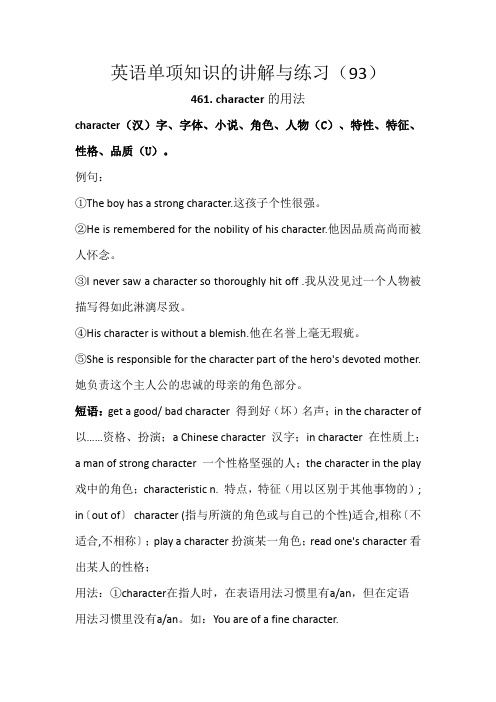
英语单项知识的讲解与练习(93)461. character的用法character(汉)字、字体、小说、角色、人物(C)、特性、特征、性格、品质(U)。
例句:①The boy has a strong character.这孩子个性很强。
②He is remembered for the nobility of his character.他因品质高尚而被人怀念。
③I never saw a character so thoroughly hit off .我从没见过一个人物被描写得如此淋漓尽致。
④His character is without a blemish.他在名誉上毫无瑕疵。
⑤She is responsible for the character part of the hero's devoted mother.她负责这个主人公的忠诚的母亲的角色部分。
短语:get a good/ bad character 得到好(坏)名声;in the character of 以……资格、扮演;a Chinese character 汉字;in character 在性质上;a man of strong character 一个性格坚强的人;the character in the play 戏中的角色;characteristic n. 特点,特征(用以区别于其他事物的); in〔out of〕character (指与所演的角色或与自己的个性)适合,相称〔不适合,不相称〕;play a character 扮演某一角色;read one's character 看出某人的性格;用法:①character在指人时,在表语用法习惯里有a/an,但在定语用法习惯里没有a/an。
如:You are of a fine character.②character在不指人时,在表语或定语用法习惯里通常都有a/an,在定语用法里也有不用a/an,但不普遍。
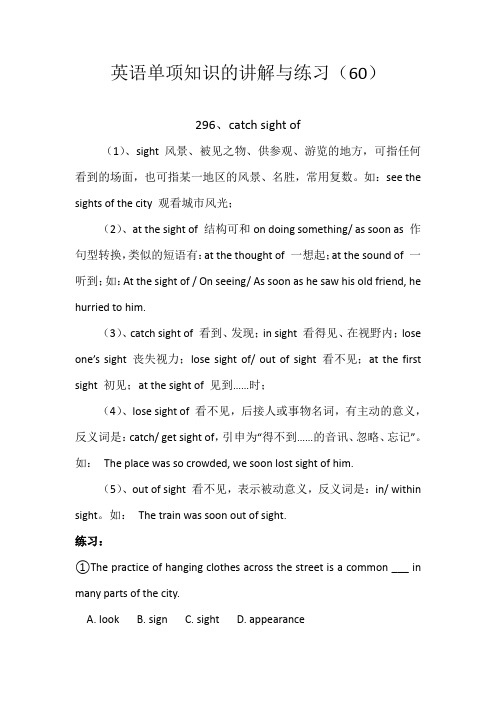
英语单项知识的讲解与练习(60)296、catch sight of(1)、sight风景、被见之物、供参观、游览的地方,可指任何看到的场面,也可指某一地区的风景、名胜,常用复数。
如:see the sights of the city 观看城市风光;(2)、at the sight of 结构可和on doing something/ as soon as 作句型转换,类似的短语有:at the thought of 一想起;at the sound of 一听到;如:At the sight of / On seeing/ As soon as he saw his old friend, he hurried to him.(3)、catch sight of 看到、发现;in sight 看得见、在视野内;lose one’s sight 丧失视力;lose sight of/ out of sight 看不见;at the first sight 初见;at the sight of 见到……时;(4)、lose sight of 看不见,后接人或事物名词,有主动的意义,反义词是:catch/ get sight of,引申为“得不到……的音讯、忽略、忘记”。
如:The place was so crowded, we soon lost sight of him.(5)、out of sight 看不见,表示被动意义,反义词是:in/ within sight。
如:The train was soon out of sight.练习:①The practice of hanging clothes across the street is a common ___ in many parts of the city.A. lookB. signC. sightD. appearance②___ of his mother, the baby stopped ___.A. at sight; cryingB. At the sight; to cryC. At a sight; to cryD. At the sight; crying③They watched the train until it ___.A. was out of sightB. lost sightC. was disappearedD. was lost sight④If you stand here, you’ll get a better ___ of the river.A. sightB. viewC. sceneD. Scenery⑤For miles around me there was nothing but a desert, without a single plant or tree _____ .A. in sightB. on earthC. at a distanceD. in place297、be similar to(1)、similar 类似的、想象的、不是同一的,similar 前要用a,后要用to。
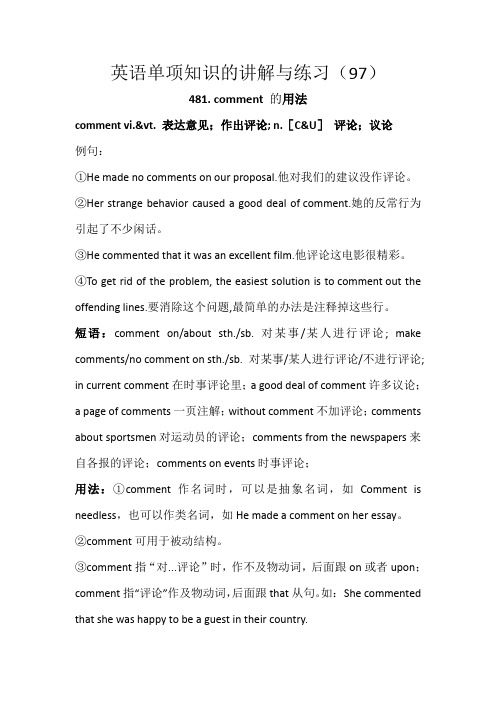
英语单项知识的讲解与练习(97)481. comment的用法commentvi.&vt. 表达意见;作出评论; n.[C&U]评论;议论例句:①He made no comments on our proposal.他对我们的建议没作评论。
②Her strange behavior caused a good deal of comment.她的反常行为引起了不少闲话。
③He commented that it was an excellent film.他评论这电影很精彩。
④To get rid of the problem, the easiest solution is to comment out the offending lines.要消除这个问题,最简单的办法是注释掉这些行。
短语:comment on/about sth./sb. 对某事/某人进行评论; make comments/no comment on sth./sb. 对某事/某人进行评论/不进行评论; in current comment 在时事评论里;a good deal of comment 许多议论;a page of comments 一页注解;without comment 不加评论;comments about sportsmen 对运动员的评论;comments from the newspapers 来自各报的评论;comments on events 时事评论;用法:①comment作名词时,可以是抽象名词,如Comment is needless,也可以作类名词,如He made a comment on her essay。
②comment可用于被动结构。
③comment指“对...评论”时,作不及物动词,后面跟on或者upon;comment指“评论”作及物动词,后面跟that从句。
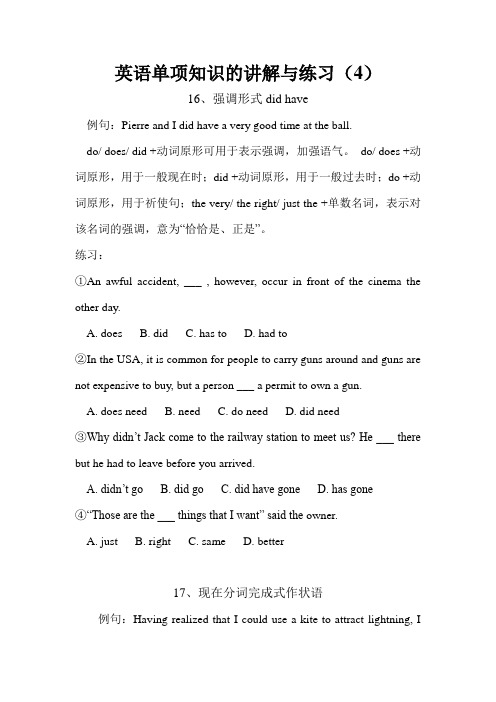
英语单项知识的讲解与练习(4)16、强调形式did have例句:Pierre and I did have a very good time at the ball.do/ does/ did +动词原形可用于表示强调,加强语气。
do/ does +动词原形,用于一般现在时;did +动词原形,用于一般过去时;do +动词原形,用于祈使句;the very/ the right/ just the +单数名词,表示对该名词的强调,意为“恰恰是、正是”。
练习:①An awful accident, ___ , however, occur in front of the cinema the other day.A. doesB. didC. has toD. had to②In the USA, it is common for people to carry guns around and guns are not expensive to buy, but a person ___ a permit to own a gun.A. does needB. needC. do needD. did need③Why didn’t Jack come to the railway station to meet us? He ___ there but he had to leave before you arrived.A. didn’t goB. did goC. did have goneD. has gone④“Those are the ___ things that I want” said the owner.A. justB. rightC. sameD. better17、现在分词完成式作状语例句:Having realized that I could use a kite to attract lightning, Idecided to do an experiment.Having realized是现在分词的完成式,在句中作状语,表示该动作发生在谓语动词的动作之前,相当于When I had realized that …;现在分词作状语,表示时间、原因、条件、结果,相当于一个状语从句。
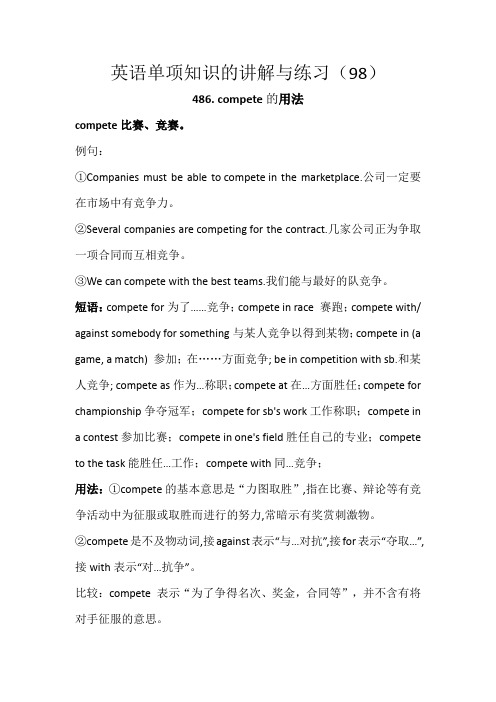
英语单项知识的讲解与练习(98)486. compete的用法compete比赛、竞赛。
例句:①Companies must be able to compete in the marketplace.公司一定要在市场中有竞争力。
②Several companies are competing for the contract.几家公司正为争取一项合同而互相竞争。
③We can compete with the best teams.我们能与最好的队竞争。
短语:compete for为了……竞争;compete in race 赛跑;compete with/ against somebody for something与某人竞争以得到某物;compete in (a game, a match) 参加;在……方面竞争; be in competition with sb.和某人竞争; compete as 作为…称职;compete at 在…方面胜任;compete for championship 争夺冠军;compete for sb's work 工作称职;compete in a contest 参加比赛;compete in one's field 胜任自己的专业;compete to the task 能胜任…工作;compete with 同…竞争;用法:①compete的基本意思是“力图取胜”,指在比赛、辩论等有竞争活动中为征服或取胜而进行的努力,常暗示有奖赏刺激物。
②compete是不及物动词,接against表示“与…对抗”,接for表示“夺取…”,接with表示“对…抗争”。
比较:compete 表示“为了争得名次、奖金,合同等”,并不含有将对手征服的意思。
contest 所表示的竞赛可以是友谊赛,也可以是有敌意的竞赛,旨在比试技能、能力、力气、耐力等,此外还可以表示赢得选举。

一、单复数(偶尔会考,但是错的概率还蛮高的,因为看起来简单,其实更容易忘记。
)1、名词单复数I like bananas (banana) very much. That is an apple (apple).2、be动词单复数(这里要注意过去时,不要忘记看后面的时态)There is (be) a pair of shoes under the bed. Here is (be) some water for you.I am (be) very glad to see you. Tom and I are (be) in the same class. Where were (be) you just now? I was (be) in the playground.3、代词单复数These(this) are rulers. Liu Tao is doing his(their) homework.二、名词所有格(这种题型的更容易错,我的学生就经常错在这个题型上,不是不会做,而是要忘记。
)This is Helen’s (Helen) scarf. Happy Children’s(children) Day.三、人称代词和物主代词1.人称代词—主格(在句中作主语,陈述句中一般在开头,一般疑问句中一般是第二个单词……)We(our) milked cows on the farm yesterday. Does she(her) have a new bike? Which pen do you(your) like? On Christmas Day I(my) got many presents.2.人称代词—宾格(在句中作宾语,一般用在动词或介词后)Let me(mine) have a look. David is behind her(she).3.物主代词—形容词性(用在名词前)What is your(you) job? Miss Li is their(them) English teacher.4.物主代词—名词性(相当于“形容词性物主代词+名词”)The teapot is his(he). Yours(your) is over there.四、基数词和序数词1.基数词表示数量There are five(fifth) birds in the tree.2.序数词表示顺序March is the third(three) month in a year.常见序数词first second third (不要拼错了,学作文时也可以用)五、动词—时态(时态也是一个非常重要的一点,一定要在考试时注意。
英语单项知识的讲解与练习(29)141、no matter how hard it isno matter how ...引导让步状语从句,意为“无论多么……”,how 后跟形容词或副词,相当于“however + adj./adv.”句式。
no matter意为“无论;不管”时,引导让步状语从句,常用于下列句型中:no matter what (who/when etc. )... 分别表示“无论何事”、“无论何人”、“无论何时”等,这个从句可以置于主句之前,也可以置于主句之后。
no matter后接关系代词或关系副词引导的状语从句在句中作让步状语。
no matter what (who, which, where, when … )只能引导让步状语从句;whatever (whoever, whichever, whomever)既可引导让步状语从句,也可引导名词性从句。
no matter 引导的分句表达的是将来的含义,但形式上要用现在时。
如:No matter who will come (改为:comes);no matter 引导的分句不能作宾语或主语。
如:I’ll eat no matter what (改为:whatever) you give me;whichever意为“无论哪个;无论哪些”;whatever意为“无论什么;凡是……的事物”。
whichever可以引导名词性从句或让步状语从句,which是个疑问词;用在疑问句中,或作关系代词,引导定语从句。
no matter which只能引导让步状语从句;而whichever可引导让步状语从句和名词从句。
no matter which可以用whichever代替,但两个同时出现在选项中时,必须选whichever。
练习:①No matter ___ he said, I don’t like him.A. whatB. howC. thatD. why②No matter ___ you go, I will go with you.A. whatB. whichC. whereD. that③That student is discourteous; he complains ___ one tries to please him.A. howeverB. whateverC. no matter whatD. no matter how④_____ the problem may be, we must solve it ourselves.A. Whatever difficultB. How difficultC. However difficultD. No matter what difficult⑤It is generally considered unwise to give a child _____ he or she wants.A. howeverB. whateverC. whicheverD. whenever⑥We’ll eat at _____ restaurant has a free table.A. whichB. whateverC. whicheverD. no matter which⑦These wild flowers are so special that I would_____ do I can to save them.A. whateverB. thatC. whichD. whichever142、mind doing something(1)、mind doing something 通常用于疑问句、否定句和条件句等结构中,这个结构前还可加所有格定语。
英语单项知识的讲解与练习(81)401. candidate的用法candidate (n)候选人、投考者;例句:①There are three candidates for the vacancy.这一空缺有三名候选人。
②She had been nominated as candidate for the presidency.她已被提名为总统候选人。
③He made several favorable comments about their candidate.他对他们的候选人发表了一些有利的评论。
④Most candidates passed in grammar.参加考试的人大多数语法及格。
短语:as a candidate作为候选人;candidate for office公职候补者;candidate of a degree学位候选人;defeated〔failed〕candidate落选人员,不合格者;leading candidate主要候选人;selected candidate入选者;candidate for Presidency总统候选人,用法:candidate for后面一般加职业或者职位等,表示某方面的候选人。
如:John was the strongest candidate for the job.练习:①I guess Jones didn’t have a chance to win the election. Almost all of the people in the city voted for his ____.A. opponentB. candidateC. colleagueD. advocate②They’re interviewing three _____ for the post of sales manager.A. sponsorsB. candidatesC. advocatesD. opponents③They are interviewing candidates _____ the job of sales managers.A.ofB.aboutC.forD.in④This candidate does not _____ the requirement that secondary school should be completed.A.makeB.getC.takeD.meet402. caution 的用法caution (n)小心、谨慎、警告;例句:①The teacher gave Tom a caution and told him never to do it again.老师给了汤姆一次警告,叫他不许再那样做。
英语单项知识的讲解与练习(49)241、be likely to do something(1)、likely 像……的、可能的,是形容词;很可能,是副词,不能单独使用,必须由very, quite, more, most 等到来修饰。
如:It is going to rain likely;要改为: It is likely to rain/ It is going to rain very likely.(2)、likely 暗示从表面迹象判断,某事有可能发生或可能是真的。
如:This looks a likely field for wheat.(3)、possible 有可能,强调客观上有可能性,但也含有实际上希望很小。
如:He is a possible choice.(4)、probable 很有可能,指有根据、合乎情理、值得相信的事物,有大概、很可能的意味。
如:I don’t think the story is probable.练习:①He is ___ to come this afternoon.A. possibleB. probableC. possiblyD. likely②You may ___ remember some idioms in your study, but you couldn’t ___ remember all the idioms in English.A. probably; possiblyB. possibly; probablyC. likely; possiblyD. probably; likely③Only in this way ___ master it well.A. you will possiblyB. will you be possible toC. will it be possible for you toD. you can④The train was ___ to arrive at 11:30, but it was an hour late.A. aboutB. likelyC. certainD. supposed⑤I can’t go out. It is very_____ that Mary will ring me tonight.A. likelyB. possiblyC. probablyD. perhaps⑥Tom was_____ to win first prize in the competition, but his illness made him miss the chance.A. possibleB. probableC. likelyD. Maybe242、look down upon/ on(1)、表示人的外貌、美貌、模样时用looks。
初中英语语法知识点详解与习题训练英语是国际交流中最重要的语言之一,掌握好英语语法知识对于学习和运用英语来说至关重要。
在初中英语学习过程中,学生需要掌握一些基本的语法知识点,以便正确地理解和使用英语。
本文将详细介绍一些初中英语语法知识点,并提供相应的习题训练,帮助学生巩固所学知识。
一、单数和复数名词1. 单数名词是指表示一个或一种事物的名词,如“dog”(狗),“book”(书)等。
在句子中,单数名词可以和不定冠词“a”或“an”连用,表示一个或一种事物。
例句:I have a dog.(我有一只狗。
)2. 复数名词是指表示两个或两个以上事物的名词,如“dogs”(狗),“books”(书)等。
在句子中,复数名词可以和定冠词“the”连用,表示特指某些事物。
例句:The dogs are playing in the park.(狗们正在公园里玩。
)练习题:用所给名词的适当形式填空。
1. I have two ________.(apple)2. Please give me a ________.(cup)3. Do you have any ________?(brother)二、形容词的比较级和最高级1. 形容词的比较级用来比较两个人或物的大小、高低、速度等。
规则变化:形容词的比较级通常在词尾加“er”,如“bigger”(更大的),“faster”(更快的)等。
2. 形容词的最高级用来表示三个或三个以上人或物中最大、最高、最快等。
规则变化:形容词的最高级通常在词尾加“est”,如“biggest”(最大的),“fastest”(最快的)等。
练习题:选择合适的词填入句子中。
1. Lucy is ________ than Lily.(tall)2. The elephant is ________ animal in the world.(big)3. This car is ________ than that one.(fast)三、动词的时态1. 现在时态用于描述当前正在发生的事情或经常发生的事情。
英语单项知识的讲解与练习(46)226、for的用法(1)、for 表示“限用于”。
如:a ticket for tonight今晚的票;(2)、由for引导的时间短语,all加名词前的for必须省去。
(3)、句子的谓语动词是非延续性的,for不能省。
如:I haven’t spoken to him for three months.(4)、for years/ for ages中的for在句首不能省。
(5)、for短语修饰动词时,不用动名词作for的宾语。
如:The children set off for(去going to)school. 当for短语修饰名词时,用动名词作for的宾语,表示某物的用途。
如:I have sent my coat away for cleaning.(6)、用for(因为)连接的并列句,前一分句表示结果,后一分句表示原因;用so(所以)连接的并列句与之相反,前一分句表示原因,后一分句表示结果。
练习:①I wanted two seats ___ Madame Curie for Friday night, I rang the cinema to see if I could book two tickets.A. ofB. aboutC. toD. for②He sold his old car ___ ¥2000, and bought a new one ___ double price.A. at; atB. for; atC. at; forD. for; for③He’s only a boy ___ 8 years old, but he’s been to the Gr eat Wall ___ 5 times.A. for; forB. of; forC. of; /D. at; to④“Are you ___ my plan?”said the chairman angrily.A. go againstB. forC. going onD. in227、be free to do sth(1)、free the bird from/ of the cage 把鸟从笼中放出;free somebody from/ of debts 使某人免除债务(from 注重免除之意,of注重救济之意);be free to enter the room = be free of the room 随便进入房间;(2)、位子是空的要用be free;free 可指时间上的“空闲的(not busy)”,也可指某一场所“空闲着(not being used)”;free 自由的、随意的、随心所欲的,等于:be able to do what one wants to (3)、free解放、使自由,作动词意为“放松、放走”。
如:You must free the butter fly.(4)、free 放在动词后,表示不需要付钱或免费的。
如:You can eat free in my restaurant.练习:①How we wished to be ___ from noises.A. keepB. stopC. freeD. fit②I have two ___ evenings this week. I can help you to do it.A. freeB. goodC. wellD. useful③Few areas in the world nowadays are completely free ___ air pollution.A. againstB. withC. toD. of④You are ___ to go or stay. It is none of my business.A. readyB. willingC. easyD. free⑤Sometimes, supermarkets offer customers some goods ___.A. for freedomB. for freelyC. free of chargeD. free from charge⑥After Lincoln was made ___ president of the US, he insisted on the slaves ___.A./; be set freeB. /; being set freeC. the; setting freeD. the; being set free228、guarantee to do sth(1)、guarantee作名词后接on或with,表示某种产品的保单;如:A six-month guarantee on the TV set for all repairs might be necessary.(2)、guarantee后接to,表示“对……的保证”。
如:A money-back guarantee to those unsatisfied with the products;(3)、guarantee作动词宾语后接against,表示“保证不受”;如:This contract guarantees you against damage by fire or flood.(4)、guarantee后接to,表示“为某人提供……的保证”。
如:Perfect satisfaction is guaranteed to our customers.(5)、guarantee有时后接双宾语,表示保证某人享有某种权利等。
如:This guarantees you the right to use the typewriter.(6)、guarantee后接that从句,从句中不含情态动词时,表示“确信”,反之,表示“担保”。
如:I can guarantee that you will enjoy yourself./ I guarantee that he shall pay on August 20.练习:①The watch is still ___ guarantee.A. atB. underC. onD. at②This kind of behaviour is guaranteed ___ him angry.A. to makeB. makingC. madeD. have made③This iron is guaranteed for a year ___ faulty workmanship.A. underB. againstC. overD. on④I ___ that you’ll enjoy yourself.A. sureB. guaranteeC. suredD. guaranteed⑤In the storm, we must ___ every family ___ loss.A. promise; byB. promise; againstC. keep; forD. guarantee; from⑥Working hard is not only a _______ of great success, but is among the essential requirements.A. signB. signalC. guaranteeD. Supposition229、happen to do something(1)、1)、happen to do something 碰巧做某事;2)、something happen to somebody/ something 某人(物)偶然发生了某事;3)、I happened to have no money with me = It (so) happened that I had no money with me/ I happened not/ didn’t happen to have any money with me我碰巧身上没带钱;(2)、happen作“发生、碰巧”讲时,后跟不定式,也可用其进行式或完成式。
作“碰巧、偶然”讲时,若用it作形式主语,其真正主语一般用that主语从句,而不用不定式。
“碰巧”的否定式是:don’t happen to do something/ happen not to do something;(3)、take place 发生,通常指事先有安排或正常发生的事。
如:In 1919, the May 4th Movement took place in China.(4)、happen 发生,通常指意料之外的事。
如:When did the accident happen?(5)、break out 发生,通常指突然爆发的事情,如战争、火灾等突发事件。
如:A fire broke out during the night.练习:①The manager happened to ___ breakfast when I called at his home yesterday morning, and so he asked me to wait for a minute.A. have hadB. be havingC. haveD. having②A terrible accident ___ on the highway to one of my close friends yesterday, leaving his left leg cut off.A. happenedB. took placeC. came aboutD. came into being③What ___ to him? He had his leg broken while playing football.A. took placeB. happenedC. broke outD. was happening④I don't know what i'd do if anything ___ him.A. happenedB. was happenedC. happened toD. was taken place to230、height的用法(1)、表示“高处”时,height单复数形式同义。
表示在某高度时,用at a height of。
问一样东西的高度,用what。
表示高度的形式: The tower is 67 feet high. / A sixty-seven-foot-high tower was built near the river. / The tower is 67 feet in height.(2)、形容词修饰带数词的名词时,放后面。